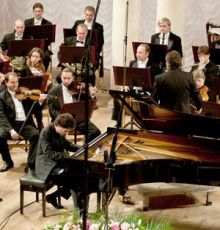The pianist Adam LALOUM was the youngest participant of the festival. This virtuoso was born in 1987. As a student he won many awards: the Maurice Ravel Prize, a grant from the Fondation de France, the ADAMI grant, and a grant from la Fondation Groupe Banque Populaire. Last year Laloum won the First Prize and Audience’s Favorite Prize at the Clara Haskil International Competition of Pianists (Switzerland). Currently the musician combines studies at the Hamburg Hochschule fuer Musik and an active touring activity, giving performances in different countries.
What attracted you to the piano? Where did you master it? Who were your teachers?
“Frankly speaking, I did not choose. I had a piano at home, my elder brother played it, so I heard the sounds of the instrument on a regular basis and wanted to learn to play it as well as he did. In my native town, Toulouse, Madame Buniase was my first teacher. She was an elderly woman, fond of children, but she treated me strictly because I was a madcap and not a simple child. Four years ago I graduated from the Paris Conservatoire (Michel Beroff’s class) and now I am studying in Hamburg in Evgeny Korolyov’s class.”
You have been taught by French teachers, now you have a Russian teacher. Is there any difference?
“My teachers are unique people, belonging to one or another nationality has had an effect on their characters. Perhaps I will seem unjust concerning Beroff, but Korolyov seems a more subtle and deep pedagogue to me. His imagination is very rich: our meetings are always different, each time he is a different teacher, and I like his classes a lot. For a musician it is very important to see and master something new. However, Korolyov is very demanding at times (it seems to me a French person cannot be so strict), he always expects much from his students and makes them work to the maximum.”
Besides solo programs you perform much chamber music. What is closer for you, ensemble or solo performances?
“You know there was a period when I was playing and wanted to play only chamber music, but the Clara Haskil Competition has gradually changed my attitude to solo performances. I wanted to see myself not just as a part of an ensemble, but as a solo performer, to understand what I am, what is the jury’s opinion about me. In a word, I wanted to try myself. I like chamber music very much, just like solo compositions. They all have numerous positive aspects. For example, my friends and I like to play together, to feel independent and free, to be responsible for what we are doing, talk, discuss professional subtleties — this teaches us a lot. In solo compositions you have the possibility of self-realization, and no one will bother you, unlike in ensemble performances, where you have to be tolerant to your partners and all the time seek a compromise. Therefore I cannot say what kind of music is dearer to me: I need both.”
What did you learn at the master classes and how has the victory at the Clara Haskil Competition influenced your professional activity?
“I have met wonderful people at the master classes, renowned musicians (Dmitri Bashkirov, Paul Badura-Skoda, Pascal Devoyon and Jean-Claude Pennetier) who taught me to see life and work in a new way. Such meetings become part of you, taking a certain place in your heart and thoughts. And after winning the Clara Haskil competitions I started to give more concerts and receive more invitations. Of course, everything has become more complicated, but more interesting as well. I see many cities and countries, meet new people, acquire life and creative experience. I am going to continue with my concerts at least until the end of the year. I don’t know yet what I will do afterwards, because my profession requires much energy and strength of will. An artist should delight the audience, and this is a hard thing, which causes much worries and excitement. Maybe my strength will come to an end and I will have a desire to stop and take up something new. Who knows?”







